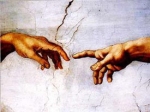Verse: Matt 21:9-10 And the crowds that went before him and that followed him were shouting,
"Hosanna to the Son of David! Blessed is he who comes in the name of the Lord! Hosanna in the highest!" ESV
As we just discussed in our previous lesson, there was a water ceremony that took place every day
during the Feast of Tabernacles where there was a great procession from the Temple to the pool of
Siloam to collect a pitcher of water and pour it through special receptacles to the outer court. This
procession was elaborate and filled with joy, clamor, and music. It was a great parade! As part of the
procession priests cut and carried great long palm fronds. These were not the little palm frond we have
seen at various “Palm Sunday” events in our churches, they were like giant banners that they held
upright like long poles. As they walked through the streets they would swing the palm branches in
unison creating a great “swooshing” sound. This was the Festival of Joy!
This event happened every day during the feast and it culminated in its greatest celebration on the last
day.
A glimpse of “Tabernacles” in “Passover”.
In Matthew 21 we see a similar but unrehearsed event just before the actual Passover sacrifice of our
Messiah.
Roughly a week before the Crucifixion, Jesus entered Jerusalem on the foal of a donkey. The foal was the
young male offspring of a female mother. Jesus rode the young foal.
Matthew 21:7-11
They brought the donkey and the colt and laid their coats upon them, and He seated Himself on
them [the clothing].
And most of the crowd kept spreading their garments on the road, and others kept cutting
branches from the trees and scattering them on the road.
And the crowds that went ahead of Him and those that followed Him kept shouting, Hosanna (
O be propitious, graciously inclined) to the Son of David, [the Messiah]! Blessed (praised,
glorified) is He Who comes in the name of the Lord! Hosanna (O be favorably disposed) in the
highest [heaven]! [Ps 118:26.]
And when He entered Jerusalem, all the city became agitated and [trembling with excitement]
said, Who is This?
And the crowds replied, This is the prophet Jesus from Nazareth of Galilee. AMP
(This type of impromptu coronation was not uncommon in that culture – see 2 Kings 9:13)
The term “Hosanna” translates to “Save us now!” – The crowds were pleading for Jesus to become their
King and Savior.
The King’s entrance.
Traditionally, a king who came in peace would ride a donkey. To ride on a horse indicates that the king
has come for war. Jesus was coming to make peace between God and man and the crowds were
acknowledging who He was and what His purpose was even though they did not understand fully what
they were doing. The joyous celebration with palm branches strongly resembles the procession of the
water ceremony at the Feast of Tabernacles.
Immediately after the procession, there was trouble.
Matthew 21:12-17
12 And Jesus went into the temple (whole temple enclosure) and drove out all who bought and
sold in the sacred place, and He turned over the four-footed tables of the money changers and
the chairs of those who sold doves.
13 He said to them, The Scripture says, My house shall be called a house of prayer; but you have
made it a den of robbers. [Isa 56:7; Jer 7:11.]
14 And the blind and the lame came to Him in the porches and courts of the temple, and He
cured them.
15 But when the chief priests and the scribes saw the wonderful things that He did and the boys
and the girls and the youths and the maidens crying out in the porches and courts of the temple,
Hosanna (O be propitious, graciously inclined) to the Son of David! they were indignant.
16 And they said to Him, Do You hear what these are saying? And Jesus replied to them, Yes;
have you never read, Out of the mouths of babes and unweaned infants You have made
(provided) perfect praise [Ps 8:2.]
17 And leaving them, He departed from the city and went out to Bethany and lodged there. AMP
The religious leaders did not understand that the peace this King was ushering into the city and the
nation was peace between God and man. By necessity, every obstacle that interferes with this
relationship of peace needs to be driven out. Jesus did not randomly or constantly run out the money
changers from the Temple. He did this two times, once near the beginning of his public ministry and
once near the end. Both times He drove out the sellers were during the time of year that the women
were cleaning out the leaven from their homes, just preceding the Passover celebration and the Feast of
Unleavened Bread. Instead of a family home, Jesus went into his Father’s house (the Temple) and
purged the leaven and mixture from it.
It is interesting to also note that Jesus’ declaration in John 7 during the last day of the feast also
produced arguments and dissention.
John 37: 37,38
37 Now on the final and most important day of the Feast, Jesus stood, and He cried in a loud
voice, If any man is thirsty, let him come to Me and drink!
38 He who believes in Me [who cleaves to and trusts in and relies on Me] as the Scripture has
said, From his innermost being shall flow [continuously] springs and rivers of living water.
Bringing peace is tough business because it requires the identification of everything that opposes or
wants to replace true peace. Jesus is the Prince of Peace and the Lord of Lords at the same time without
any mixture or conflict within Himself. The purity of His love states the Truth, convicts of sin, and opens
and heals the wound all in one continuous operation. We are generally the ones to separate Him into
compartments that fit our own conceptions so we can maintain the status quo.
So there we have it again, God declaring the end from the beginning. We see a glimpse of the last and
greatest appointed fime in the first.
Jesus demonstrates His rule as a King in Jerusalem.
Jesus entered Jerusalem with a celebratory procession just before Passover, and He stirred up the whole
town including the religious leaders and teachers. He sat down inside the Temple courts and He began
to exercise His true rulership over the people--He healed them!
Matthew 21: 14
And the blind and the lame came to Him in the porches and courts of the temple, and He cured them.
Jesus answered the prayers of the celebrants even before the Passover was complete. How much more
will He be faithful in this hour, if we yield to His direction and desires?
Both Passover and The Feast of Tabernacles are timeless events to all who have an ear to hear and an
eye to see. The appointed times are like great picture windows to show us how time and eternity
intersect. As we begin to perceive this principle, Sukkot out of season becomes less of a surprise and
more of a revelation.
Isaiah 56:7-8
7 these I will bring to my holy mountain,
and make them joyful in my house of prayer;
their burnt offerings and their sacrifices
will be accepted on my altar;
for my house shall be called a house of prayer
for all peoples."
8 The Lord God,
who gathers the outcasts of Israel, declares,
"I will gather yet others to him
besides those already gathered."
ESV





Terms & Conditions
Subscribe
Report
My comments